High-growth organizations use a learning experience platform (LXP) to address the low engagement and poor completion rates common with traditional learning management systems (LMSs). By focusing on the learner experience, an LXP helps jumpstart a culture that motivates team members to quickly acquire the skills they need to propel their organizations forward.
Choosing the best LXP for your needs is a decision that can greatly energize your talent development efforts.
| Table of Contents |
|---|
| LXP vs. LMS: What's the difference? |
| LXP vs. LMS: Feature comparison |
| Top 20 LXPs on the market right now |
| How to choose the right LXP |
| Final verdict and takeaway |
LXP vs. LMS: What's the difference?
What is a learning experience platform? With an LXP, the learner is at the forefront of the experience. This entails straightforward navigation and a wide variety of content options to suit individual interests. Ideally, learning experience platforms transform learners from being passive recipients of knowledge into active contributors of user-generated content. It's like having a professional learning environment at your fingertips, enabling you to choose what you learn and when you learn it, fostering a sense of independence and ongoing growth.
What is a learning management system? An LMS acts as the central hub for your company's learning initiatives. On this platform, the administrator or Learning and Development (L&D) manager takes the spotlight. It's the tool that allows organizations to craft, monitor, and distribute training materials. Serving as a cornerstone in your organization's L&D strategy, an LMS streamlines training, enhancing efficiency and cost-effectiveness to build the skills your workforce needs.
To summarize: an LXP is designed to create customized learning journeys tailored to individual needs and preferences, while an LMS prioritizes business needs such as process and cost efficiency in workplace training.
📚 Learn more: Understanding the Difference Between LMS and LXP Models
LXP vs. LMS: Feature comparison
|
|
LMS |
|
|
LXP |
||
|---|---|---|---|---|---|---|
|
Focus |
Management of learning content and delivery, with robust reporting features. | Personalized learning experiences and engagement. | ||||
|
Primary users |
Administrators and instructors. | Learners themselves. | ||||
|
Content delivery |
Structured courses and pathways. | Dynamic, flexible content adapted to the learner's needs and preferences. | ||||
|
Learning approach |
Top-down (assigned by administrators or managers). | Bottom-up (driven by the learner's choices and interests). | ||||
|
Data analytics |
Focus on course completion rates and pass/fail statistics. | Emphasis on detailed tracking of learner engagement, content interaction, and learning paths. | ||||
|
Social learning |
Often limited to discussion forums. | Extensively supports social learning features, such as peer interactions, sharing, and collaboration. |
Top 20 LXPs on the market right now
More than a hundred learning experience platforms are listed on review sites such as G2, TrustRadius, and Capterra, including hybrid services that have been similarly classified as LMS. To make it easier for you to select the solution that meets your specific needs, our researchers have created a shortlist of the highest-rated LXP vendors and further screened them based on eight criteria (learner experience, personalization, course library, community and social learning, scalability and pricing, analytics and reporting, integration with existing systems, and track record). These buying criteria represent the essential features an exceptional learning experience platform should possess.
Based on these factors, here are the 20 LXPs that can transform how your teams acquire relevant skills and how your business can optimize skills training.
| 🏆 Best Overall Learner experience: GoSkills |
| ⭐ Top Choice for content aggregation and curation: Degreed |
| ⭐ Top Choice for customization features: Docebo |
| ⭐ Top Choice for course variety: LinkedIn Learning |
| ⭐ Top Choice for collaborative and social learning: 360Learning |
Top-rated Learning Experience Platforms
-
GoSkills
-
360Learning
-
Absorb LMS
-
Adobe Learning Manager
-
Axonify
-
Canvas LMS
-
Continu
-
D2L
-
Degreed
-
Docebo
-
EdApp
-
EdCast
-
Juno LXP
-
Learn Amp
-
LearnUpon
-
LinkedIn Learning
-
Litmos
-
TalentLMS
-
Tovuti
-
Udemy Business
1. GoSkills
|
Product description |
|
|
GoSkills is a highly-rated, easy-to-use learning experience platform (LXP). By means of gamification, microlearning, and AI course recommendations, learners are engaged and motivated to continue learning. |
| Why learners and businesses like this product | Users and independent reviewers cite this solution's ease of use, quick implementation, high-quality courses, clean user interface (UI), bite-sized lessons, and top-notch customer service. | ||
|
Weaknesses and limitations |
Course library (100+ courses) is relatively smaller compared to those of some competitors due to strict quality control standards. |
||
|
Good fit for |
Small to mid-sized companies, startups, teams in large organizations, course providers, and organizations that prioritize learner experience. |
||
|
Pricing |
Transparent with no hidden fees and setup costs. Scaled pricing starts at $9.25 per user per month for a team of five learners and drops to just $5.10 for a team of 50. Growing teams get further discounts as they scale. Companies of any size that want to try or use the platform without incurring any cost are welcome to do so with a free-forever plan. |
Experience the difference
Start transforming the way your organization learns — no credit card required. Get started in minutes!
Create your free account now2. 360Learning
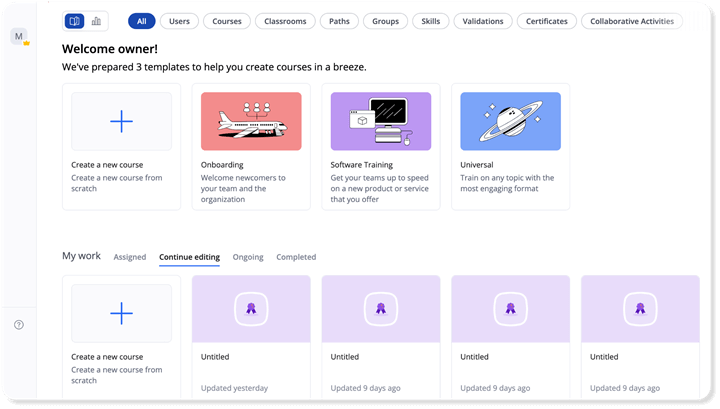
|
Product description |
360Learning is a learning platform designed to help companies train their workforces by harnessing in-house expertise and promoting collaborative learning. | ||
|
Why learners and businesses like this product |
Reviewers describe the platform as easy to use and intuitive for learners and course creators. Some users cite its highly interactive and engaging features, strong support for collaborative, social learning, and robust training management functions. | ||
|
Weaknesses and limitations |
Users cite the platform's complexity and limited functionality, particularly as it relates to administrative features. One user on G2 said the platform was "bewilderingly complex." Others mentioned having to set up an external API to get better data analytics. | ||
|
Good fit for |
Companies that want to build a culture of collaborative learning. | ||
|
Pricing |
Team subscription starts at $8 per user per month. Custom pricing is offered for business subscriptions. A 30-day free trial is available. |
3. Absorb LMS
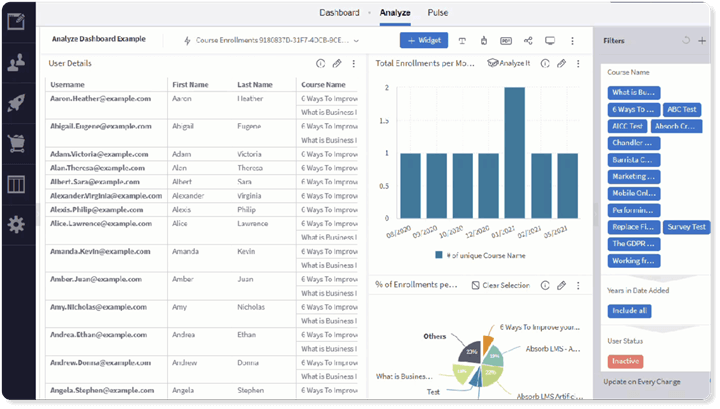
|
Product description |
Absorb LMS empowers businesses and employees with easy-to-use and dynamic learning interfaces. |
||
|
Why learners and businesses like this product |
Reviewers (including learners and administrators) cite the platform's intuitiveness and ease of use. |
||
|
Weaknesses and limitations |
Reviewers on G2 cite limited reporting functionality. On Capterra, users also cite limited assessment options and difficulties in managing blended learning. |
||
|
Good fit for |
Enterprise organizations. | ||
|
Pricing |
No upfront pricing. Cost information is available only upon request. A free trial is available. |
4. Adobe Learning Manager
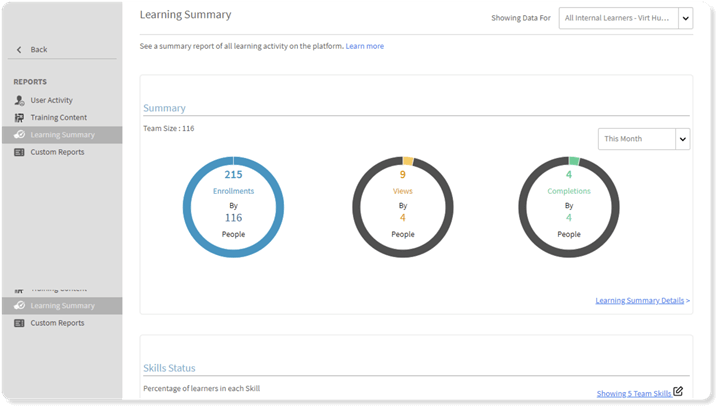
|
Product description |
Adobe Learning Manager is a platform designed to drive and scale a wide variety of learning experiences such as compliance training, customer education, and staff upskilling. | ||
|
Why learners and businesses like this product |
Users cite the platform's user-friendliness and excellent employee engagement driven by its gamification feature, mobile support, and social learning feature. Reviewers on TrustRadius give this vendor a high score for ease of integration. | ||
|
Weaknesses and limitations |
Reviewers cite issues with navigation elements, with one reporting a steep learning curve required to properly use the customization features. Another user said the following areas should be improved: data quality of reports, course suggestion system, and search function. | ||
|
Good fit for |
Mid-sized companies looking for a balanced, adequate training solution for employees, customers, and partners. | ||
|
Pricing |
No pricing upfront. Cost information is only available on request. |
5. Axonify
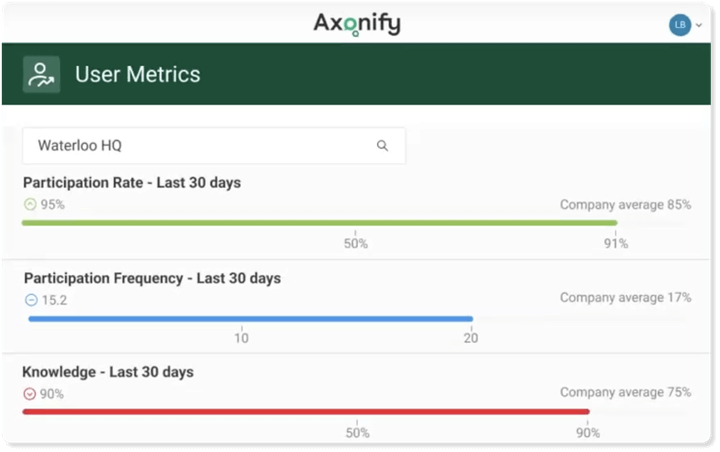
|
Product description |
Axonify is an elearning platform specifically designed to train and upskill frontline personnel. | ||
| Why learners and businesses like this product | Reviewers cite good user experience with gamification, reinforcement quizzes, and rewards. Users also cite excellent customer support. In TrustRadius' community insights, users praise Axonify's responsive updates and its team's openness to customer feedback. | ||
|
Weaknesses and limitations |
One reviewer on G2 said, “It is not for small businesses and early-stage users because of the pricing structure.” Reviewers also cite issues with the platform's reporting interface. One reviewer said, “Analytics/reporting has been a less intuitive user experience.” On TrustRadius, users cite issues with navigation, limited mobile app functionality, and complexity of options. | ||
|
Good fit for |
Companies with bigger and more flexible budgets that also employ a significant number of frontline workers in retail, finance, logistics, and other industries. | ||
|
Pricing |
No pricing upfront. Cost information only available upon request. |
6. Canvas LMS
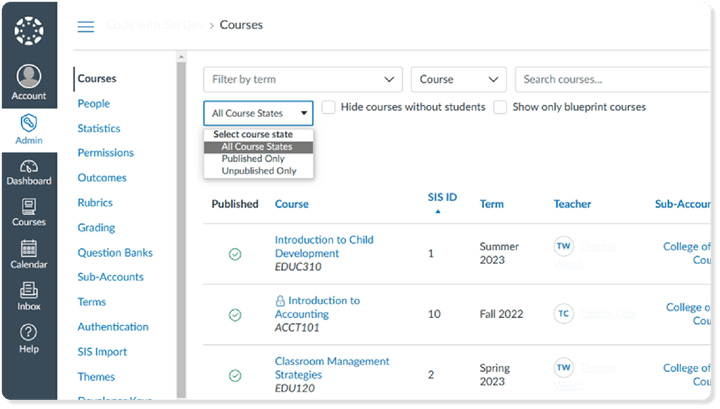
|
Product description |
Canvas is an open-source, highly adaptable learning management system originally designed and still largely used for educational applications. |
||
|
Why learners and businesses like this product |
Reviewers on G2 commend the platform's ease of use. | ||
|
Weaknesses and limitations |
On TrustRadius, users complain about navigation issues, lack of customization features, and challenges with customer support. | ||
|
Good fit for |
Educational institutions and businesses with a blended or fully virtual workplace. | ||
|
Pricing |
As an open-source software, Canvas LMS is free. Four-tier pricing for hosting services (Minimal, Small, Medium, and Enterprise) starts at $100 per month. |
7. Continu
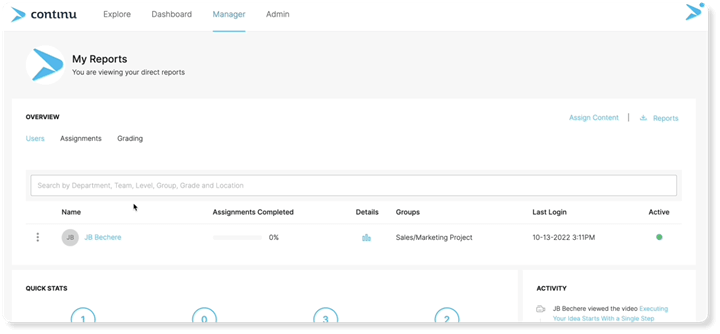
|
Product description |
Continu is a platform with robust social learning and course authoring capabilities, designed to meet a company's training goals and reporting requirements. | ||
|
Why learners and businesses like this product |
Reviewers on Capterra describe the platform as easy to use and engaging. | ||
|
Weaknesses and limitations |
Third-party data on TrustRadius highlights the platform's slow load times and clunky navigation. | ||
|
Good fit for |
Large organizations. | ||
|
Pricing |
No transparent pricing. Three tiers are available: Growth (for fewer than 250 learners), Professional (250-5000 learners), and Enterprise (over 5000 learners). |
8. D2L
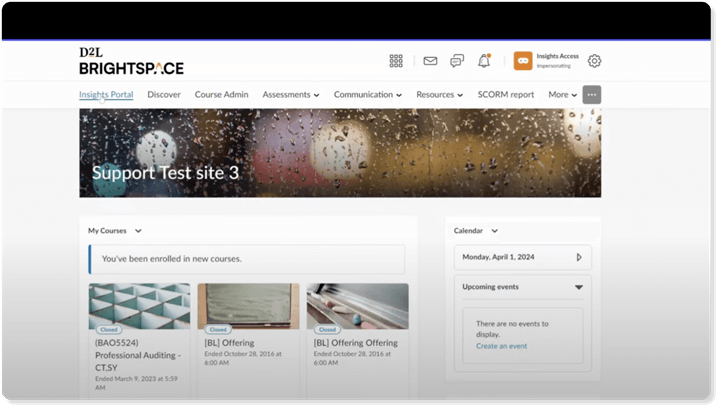
|
Product description |
D2L for Business is a learning platform that offers organizations a network of global education providers, skill development solutions, and expert consulting services to support their training programs. | ||
|
Why learners and businesses like this product |
Users cite ease of use, good design aesthetics, course variety, excellent support, and responsiveness to feedback. Reviews are mixed, however. | ||
|
Weaknesses and limitations |
Reviewers on G2 cite navigation, complexity, grading, and UI issues. On TrustRadius, reviewers mention limited customization options and low intuitiveness of the interface. |
||
|
Good fit for |
Medium to large businesses, including educational institutions. | ||
|
Pricing |
No upfront pricing. Cost is available upon sign-up and subsequent demo. |
9. Degreed
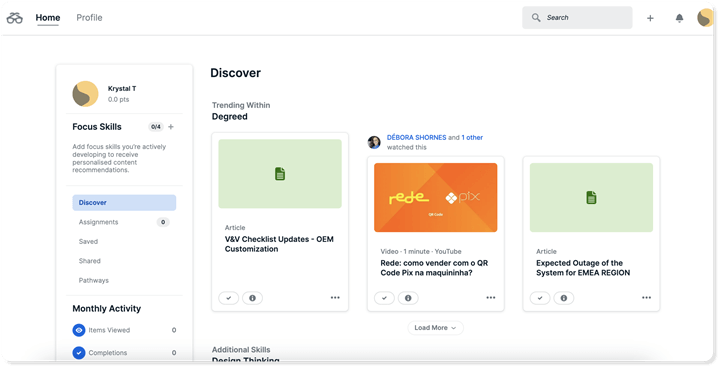
|
Product description |
Degreed is a skills-centric learning platform that enables individuals and companies to discover learning content, build skills, and drive positive business results. It promotes personalized learning journeys. | ||
|
Why learners and businesses like this product |
Reviewers on TrustRadius cite the platform's valuable learning paths and internal currency system. | ||
|
Weaknesses and limitations |
Reviewers cite difficulty in adding external materials. A recurring complaint is that learners are unable to manually select the courses they are interested in and must rely on the “category feed” provided by the Degreed algorithm. | ||
|
Good fit for |
Enterprise organizations (5000 or more employees) that value social learning. | ||
|
Pricing |
Two plans are available: LXP and LXP+. Pricing is only available by booking a sales call. |
10. Docebo
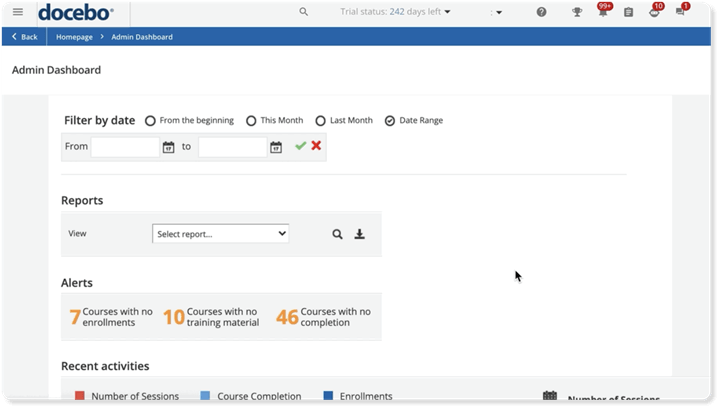
|
Product description |
Docebo presents its solution as an AI-powered platform built for enterprise environments and engineered to customize learning experiences at scale. | ||
|
Why learners and businesses like this product |
Users like its modern and user-friendly interface, significant customization capabilities, helpful user community, and extensive course library including materials produced by global publishers. | ||
|
Weaknesses and limitations |
Users cite the platform's overwhelmingly large number of features, some issues in generating reports on specific data, slow product updates, and limited content creation capabilities. Several users complain about frustrating response times. One user describes customer support as “essentially non-existent below enterprise level." | ||
|
Good fit for |
Mid-sized to large enterprises looking for an elearning solution that plugs into their existing technology stack. | ||
|
Pricing |
No upfront pricing. Cost information is only available on request. A free trial is available. |
11. EdApp
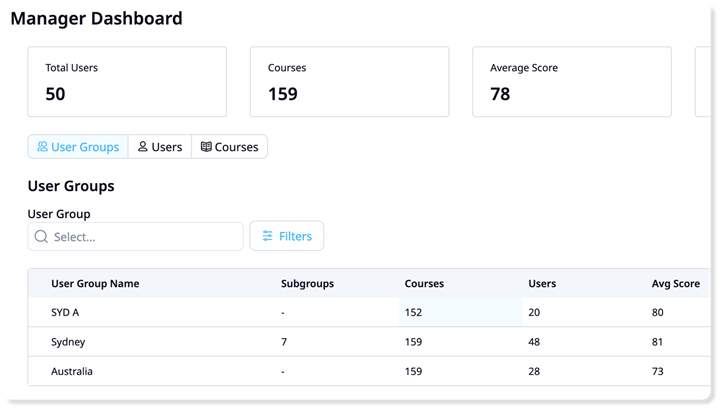
|
Product description |
EdApp is a mobile-first platform that offers a large course library and a course creation toolset. | ||
|
Why learners and businesses like this product |
Users cite the platform's ease of use and the simplicity of its course authoring tool. | ||
|
Weaknesses and limitations |
Users cite the limited number of business courses, lack of flexibility in course assignments, and limitations in its AI-assisted authoring tool. On TrustRadius, reviewers cite the platform's inconvenient sign-up process and challenging learning curve as negative experiences when using the platform. | ||
|
Good fit for |
Teams and businesses that would appreciate a mobile-first and microlearning solution. | ||
|
Pricing |
Upfront pricing with four levels: Free, DIY, Managed, and Enterprise. The DIY subscription comes with a free trial and starts at $2.95 per user per month. |
12. EdCast
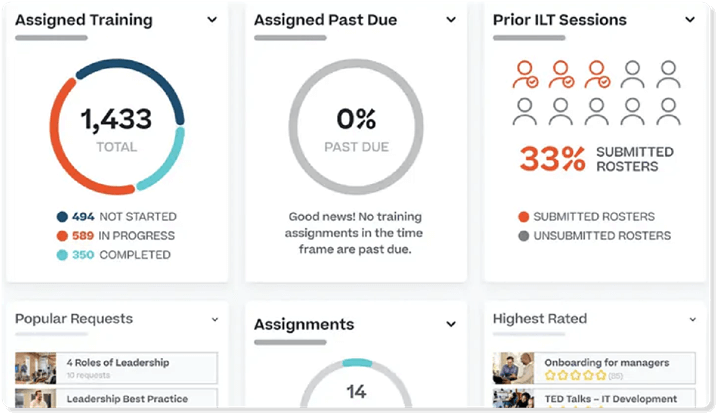
|
Product description |
EdCast is a cloud-based talent development and knowledge-sharing platform that promotes collaboration and social sharing through a robust curation of learning content and the active participation of subject matter experts. EdCast serves as the LXP offering of Cornerstone Learning. | ||
|
Why learners and businesses like this product |
Multiple reviewers praise the platform's customer support and success team. Others cite ease of use and content curation. | ||
|
Weaknesses and limitations |
One reviewer on G2 said, “Pretty but what a mess,” citing many technical issues on mobile and the lack of reporting capabilities. Another describes the administratrive function as “clumsy.” These claims are corroborated by similar feedback on TrustRadius. | ||
|
Good fit for |
Large enterprises that prioritize talent development and retention. | ||
|
Pricing |
No free version is available. A price quote is available only after booking a demo. |
13. Juno LXP
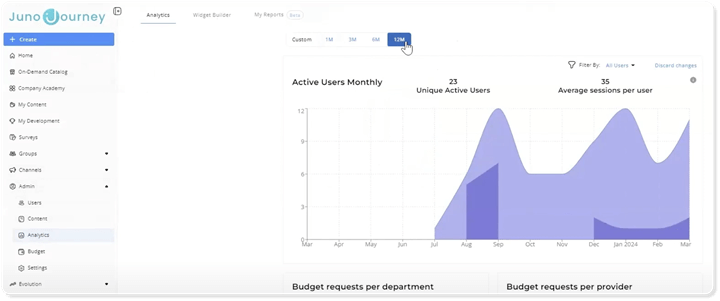
|
Product description |
Juno Journey is a modular learning platform that enables organizations to manage all their skill-building and training efforts via an LXP (Juno LXP) and an LMS component (Juno LMS). | ||
|
Why learners and businesses like this product |
Users cite the platform's ease of use, support for personalized learning paths, learner engagement tracking, and course variety. Users also like the openness and flexibility of Juno’s courses, based on sentiment data from TrustRadius. | ||
|
Weaknesses and limitations |
Product reviewers cite the following issues: outdated mobile support, occasional denial of credit card vouchers, and slow response times from the technical support team. | ||
|
Good fit for |
Companies that need a platform for upskilling people and for managing and measuring the impact of training programs. | ||
|
Pricing |
No upfront pricing. Cost information is only available on request. |
14. Learn Amp
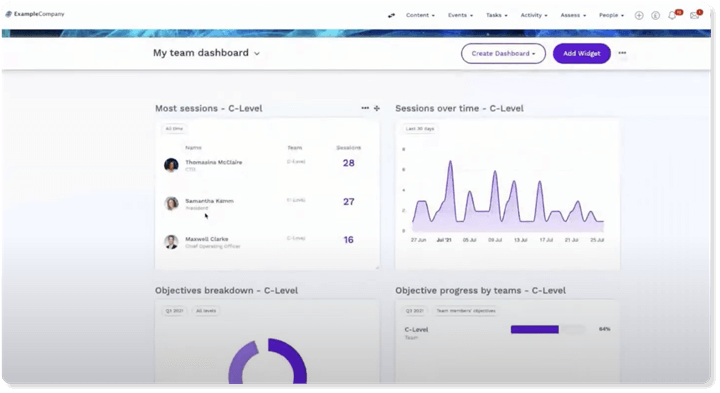
|
Product description |
Learn Amp positions its services as a complete people development hub, bringing together workplace learning, talent development, and performance improvement. | ||
|
Why learners and businesses like this product |
Reviewers cite a high degree of user-friendliness, fast and easy implementation, and a large content library. | ||
|
Weaknesses and limitations |
Reviewers on G2 cite inadequate reporting as the most common area of concern with the platform. | ||
|
Good fit for |
Medium to large-sized businesses. | ||
|
Pricing |
Pricing starts at £17,500 (~$22,000) per year for 250 users. A free trial is available. |
15. LearnUpon
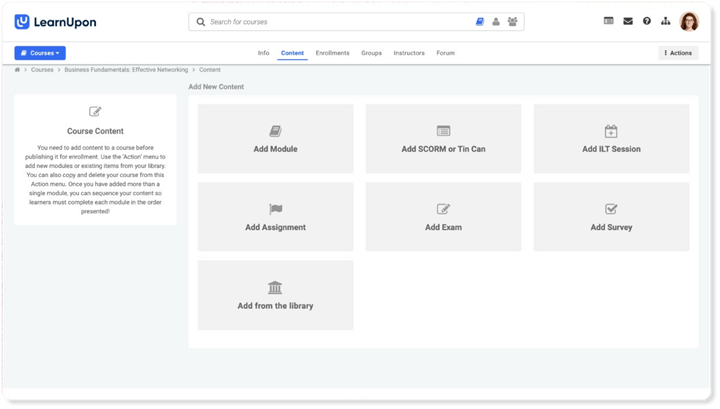
|
Product description |
LearnUpon is a full-featured solution that enables organizations to manage, deliver, and monitor high-impact training for their employees, partners, and customers. | ||
|
Why learners and businesses like this product |
Reviewers on TrustRadius describe the platform's customer service as “expansive” and “responsive.” The ticketing process has been described as “efficient.” Other users praise the platform for its intuitive interface, scalability, and ease of implementation and integration. | ||
|
Weaknesses and limitations |
Users note that the platform's forums and reporting function do not meet customer expectations. One verified reviewer cites "limited course authoring options" that required their company to use an external tool. Sentiment data on TrustRadius highlights issues with reporting and user permissions. | ||
|
Good fit for |
Organizations that seek superior customer support. | ||
|
Pricing |
Three-tiered pricing: Essential, Premium, Enterprise. No upfront pricing. Cost is available by booking a call with the sales team. A free trial is available. |
16. LinkedIn Learning
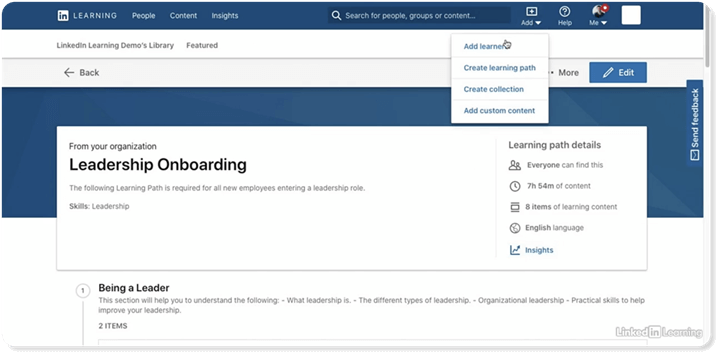
|
Product description |
LinkedIn Learning is an online learning platform designed to help individuals and organizations achieve their career and business goals. | ||
|
Why learners and businesses like this product |
Reviewers praise the platform's comprehensive database and high-quality courses from recognized field experts. Certifications of course completion are generally recognized. |
||
|
Weaknesses and limitations |
Aggregated community insights on TrustRadius include a confusing user interface, account migration issues, and dissatisfaction with technical support. | ||
|
Good fit for |
Businesses looking to develop team competencies and skills. Individuals looking to improve their professional skills and careers. |
||
|
Pricing |
Pricing starts at $378.80 per seat per year for 2-20 users. Pricing for over 21 users is only available by contacting the company’s sales team. A free trial is available. |
17. Litmos
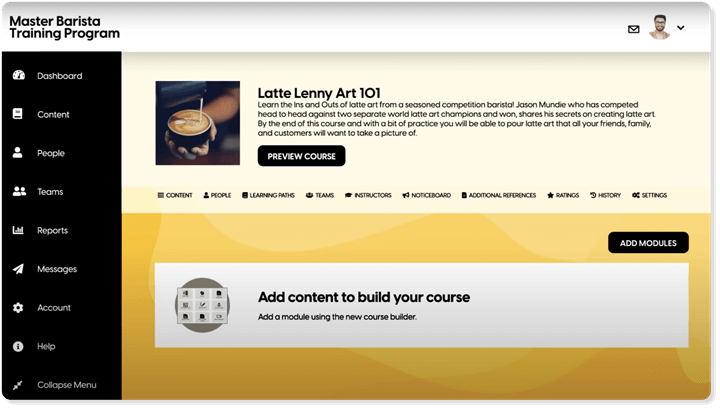
|
Product description |
Litmos is a multi-awarded elearning solution for creating, delivering, and monitoring training programs across an organization. | ||
|
Why learners and businesses like this product |
Reviewers cite the user-friendliness of the platform's interface. | ||
|
Weaknesses and limitations |
Reviewers give negative feedback about customer support and confusing course completion terminology. | ||
|
Good fit for |
Mid- to large-sized enterprises. | ||
|
Pricing |
Tiered pricing: Foundation, Premier, Platinum. The starting price is only available upon request. A free 14-day trial is available upon request. |
18. TalentLMS
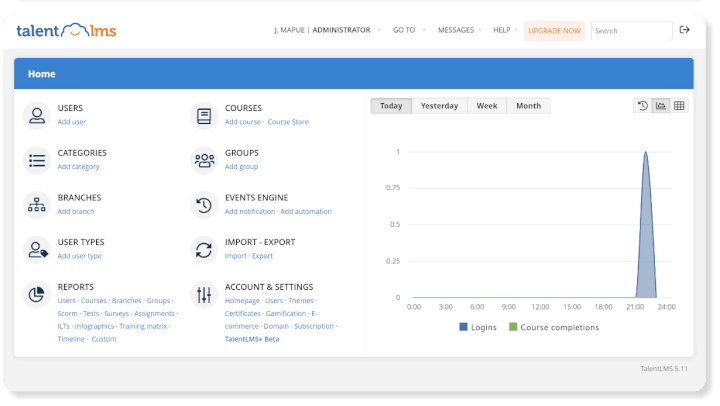
|
Product description |
TalentLMS describes itself as a fully customizable learning solution for teams. | ||
|
Why learners and businesses like this product |
Reviewers on G2 like the simplicity of the user interface and its look and feel, as well as content variety. | ||
|
Weaknesses and limitations |
Users on G2 cite issues such as limited customization features, integration challenges, and limited functionality. | ||
|
Good fit for |
Mid- to large-sized organizations. | ||
|
Pricing |
Pricing starts at $69 per month (billed annually) for up to 40 users. A free version is available. |
19. Tovuti
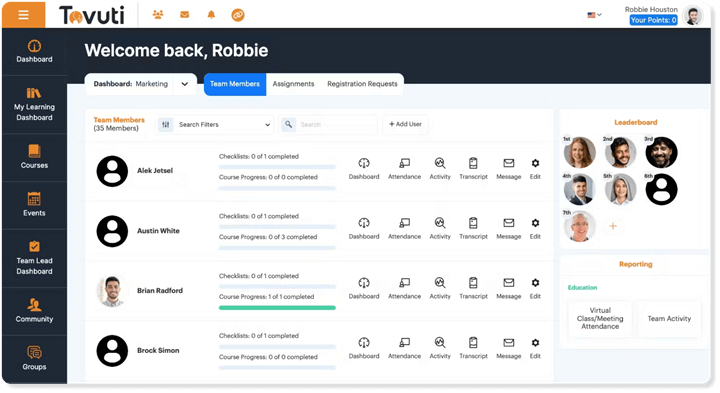
|
Product description |
Tovuti brands itself as a comprehensive, adaptive, and people-first learning management solution for organizations of all sizes. | ||
|
Why learners and businesses like this product |
Reviewers on G2 praise the platform's ease of use and robust training management features. | ||
|
Weaknesses and limitations |
One user on Capterra describes Tovuti's backend as “complex and not user-friendly.” Another cites limited reporting functionality. Other users have cited a significant learning curve in understanding some features and using them properly. On both G2 and TrustRadius, users have cited limited customization features. |
||
|
Good fit for |
L&D teams with a strong technical background. |
||
|
Pricing |
Custom pricing is based on the specific features and support required. Quotes are available upon request. There is a free trial period but no free version. |
20. Udemy Business
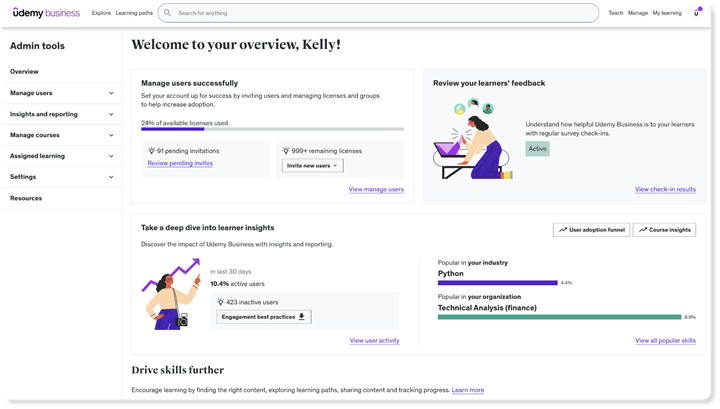
|
Product description |
Udemy Business provides an elearning solution that includes a huge library of on-demand courses for companies looking to train their employees. | ||
|
Why learners and businesses like this product |
Udemy carries an extensive library of more than 25,000 courses covering a wide range of subjects. Users cite regular additions of updated courses to the library. | ||
|
Weaknesses and limitations |
Some users cite the following issues: lack of gamification elements, outdated feel, and lack of mechanisms that motivate learners to stay the course. Others state that it is “easy to get lost in options” due to the overwhelming number of courses presented and that there is an inability to “filter out the useless courses.” Significantly, the content library includes courses from hundreds of independent instructors whose content have not been vetted. Reviewers on TrustRadius cite the high cost of courses and the sluggish user interface while using the Udemy app. | ||
|
Good fit for |
Businesses that want to offer a large number of course options. | ||
|
Pricing |
Two-tier pricing plans: Team (2-20 people) and Enterprise (more than 20 people). The Team plan starts at $30 per user per month, billed annually. There is a 14-day free trial period. |
How to choose the right LXP
Companies turn to LXPs because legacy LMS platforms fail to deliver the results necessary to stay ahead in a landscape of competing priorities and distractions. A top-down, push-oriented approach to workplace training rarely drives the learner engagement and course completion rates that eventually — and consistently — move the needle for businesses.
Only the pull-oriented approach of learner-centric platforms coupled with the analytical insights of advanced learning management systems can deliver the training outcomes that today’s organizations aim for. This blended approach can take you from good to great training, where superior user experiences and highly personalized learning paths sync seamlessly with targeted reporting and robust administrative tools.
With this in mind, let's unpack the key features to look for in a modern LXP.
Buying criteria for the best LXP
-
Engaging learner experience
-
Personalization
-
Built-in course library
-
Community/social learning
-
Scalability and pricing
-
Integration with existing systems
-
Ability to evaluate learner experience
-
Track record of customer success
1. Engaging learner experience
Learner experience plays a crucial role in shaping the learning journey. The best LXPs craft a user interface (UI) that's not only appealing and intuitive (i.e., you can explore the platform with ease and without deliberate instruction), but also deeply engaging.
When learners encounter a platform that's easy to navigate and offers content that feels tailor-made, their engagement levels soar. A well-designed UI ensures that learners find value and ease in their educational journeys, enhancing their motivation and ultimately driving better outcomes, such as increased learning retention.
Clean and smooth UI
It all starts with the look and feel of an app, service, or platform. When a platform's dashboard or an app's home screen is visually inviting, a major roadblock to adoption and sustained use has already been resolved. Complex designs that offer too many ambiguous options present a steeper learning curve and will likely intimidate most users. Simple but stylish interfaces tend to drive higher levels of engagement and user “stickiness” (i.e., returning to the platform time and time again).
Microlearning
Learning new skills in bite-sized increments is scientifically proven to be very effective. Short, focused lessons designed to meet specific learning objectives have been shown to improve engagement by 50 percent, boost knowledge retention, and cut content development costs by half. Reportedly, completion rates can rise as high as 82 percent for courses that are taken using microlearning methods.
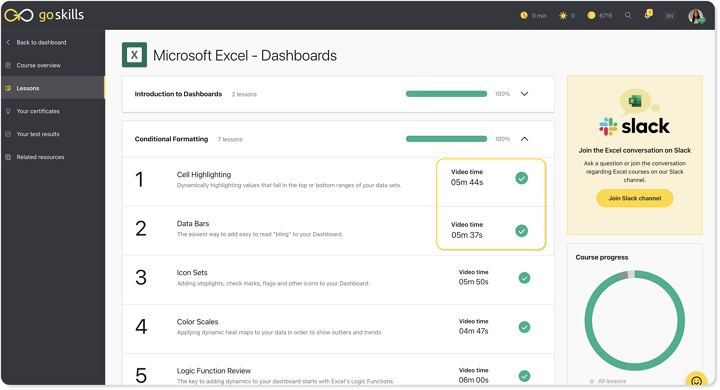
Mobile-friendly
Mobility is non-negotiable. At the bare minimum, learners should be able to develop skills even when they’re on the go — at their own pace, at any time, and on any connected device. They can, for example, start a module from their work computer, access it on their mobile while commuting, and continue their lessons on a tablet at home. Give plus points to LXPs that extend this mobile capability to administrators (for accessing the dashboard and generating reports) and to course creators (for creating and assigning lessons).
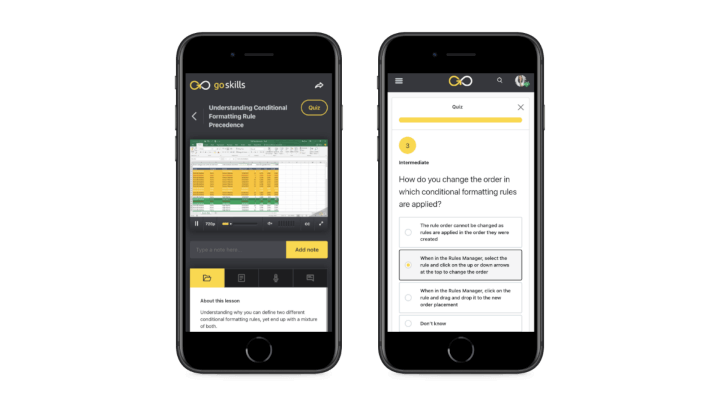
Gamification
It's no secret that the gaming industry has surpassed the combined value of the film and music markets. The proof is in the pudding: elements of play really keep the boredom away. But more importantly for LXPs, gamification makes learners want to stay. LXPs that make learning fun — with daily streaks, time-tracking goals, earned coins, achievement badges, and other personalized rewards— tend to push all the right buttons: learner motivation, team collaboration, and knowledge retention. You don't have to take our word for it because players often brag about their exploits.
Social learning
Any learning that occurs in a social context — whether through observation, collaboration, sharing, or direct instruction — tends to drive greater motivation and attention levels, increased knowledge retention rates, and improved success rates in reproducing or practicing a learned skill. LXPs that integrate social learning principles in their architecture and user flows gain many of these benefits. Discussion forums, social media communities, and native peer feedback mechanisms can help augment the capabilities and impact of an LXP.
2. Personalization
The success of workplace training largely depends on how motivated learners are to take and complete courses, and how well they retain and practice the skills they have learned. Coercive approaches to learning may work on some level; but providing learners with a high degree of flexibility and personalization can spur a behavioral shift toward continuous, self-directed learning.
Adaptive learning
Sophisticated LXPs implement adaptive learning, a data-driven approach to training and remediation. Using data analytics and statistical modeling, the LXP monitors a learner's progress and recommends the best course material and associated level based on the learner's prior interactions, assessments, performance, and other activities. This way, the strengths and weaknesses of each learner are uncovered, addressed, or nourished — leading to optimal training outcomes that can be replicated on a larger scale.
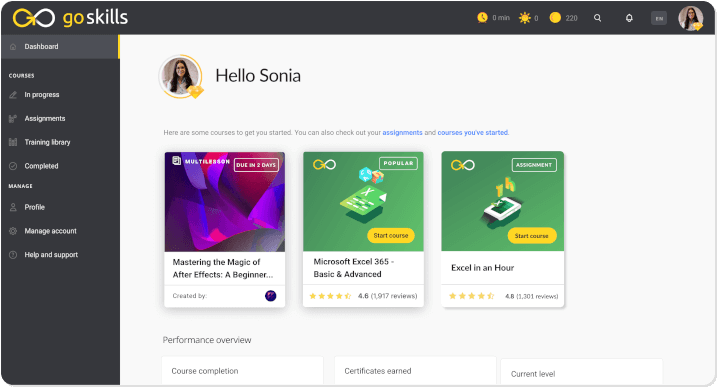
Personalized learning paths
A learner's journey toward skill proficiency can be fully self-directed, guided by training managers, or assisted by a platform's adaptive learning algorithms. The ideal learning experience platform enables all these mechanisms to grant individuals the freedom to learn on their own terms, while also providing businesses the ability to chart the most effective and fastest ways for their teams to gain skills. By tracking key metrics such as assessment scores, time spent learning, lesson completion rates, and personal progress, a good LXP can tailor content to match individual goals, preferences, and pacing.
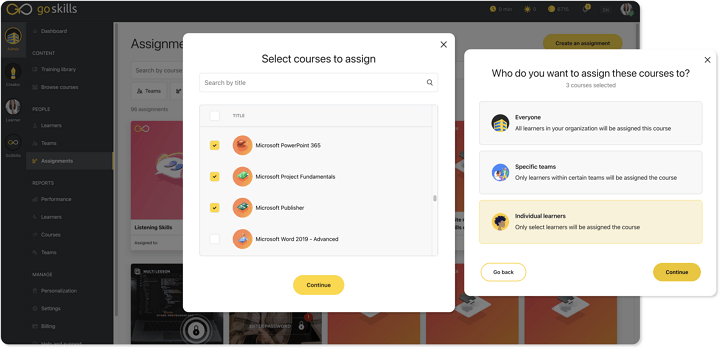
3. Built-in course library
Ignore any LXP that lacks a built-in library of quality courses. It's always good to jumpstart training with world-class elearning content — well before your L&D people have even started creating and customizing your corporate training materials. Doing this is impossible without a purposely designed native repository of expert-led courses.
These courses should be updated to equip teams with the skills they need to thrive on the job and to keep your company a step ahead of the competition. Using all available technologies, these courses and lessons should come in all the right formats to match learner preferences while achieving the business objectives of training managers.
Expert-led courses
While any decent LXP offers a built-in library of courses, volume, quality, and relevance are your key benchmarks for this feature. A platform may have thousands of courses; but if most of these are sub-standard or irrelevant to your team or line of business, you'll do better by considering a learning experience platform with a smaller library of high-quality and relevant content.
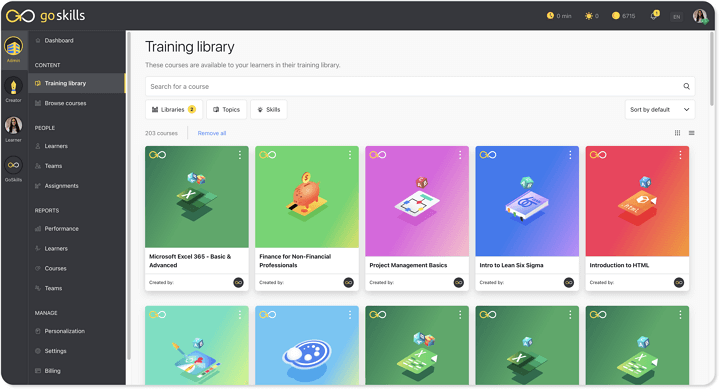
Content variety
Forcing your learners to read a 30-page PDF or watch a clunky 60-minute video to learn a new skill will more likely lead to resentment instead of achieving your training goals. Next-gen learners expect a wide variety of quality content in all shapes and formats to enhance their learning experiences. Go for a course library brimming with bite-sized video lessons, graphic reference guides, compelling lectures, practical exercises, gamified activities, and other learning content that fit whatever screen your learners are looking at.
Accreditations
Third-party accreditation and course certifications count among the most reliable indicators of how good an LXP is. For example, if completing its courses leads to industry-recognized professional certifications (such as those conferred by PMI, IASSC, and PeopleCert), then the LXP deserves to be on your shortlist.
AI-assisted authoring tool
To grow its library, an LXP provides tools for designing and developing lessons, courses, learning tracks, and training programs. Many advanced learning experience platforms now use generative AI to help instructors and course creators enhance and accelerate the process of crafting instructional content. This technology has the distinct advantage of being able to create very targeted course content for specific audiences based on precise prompts.
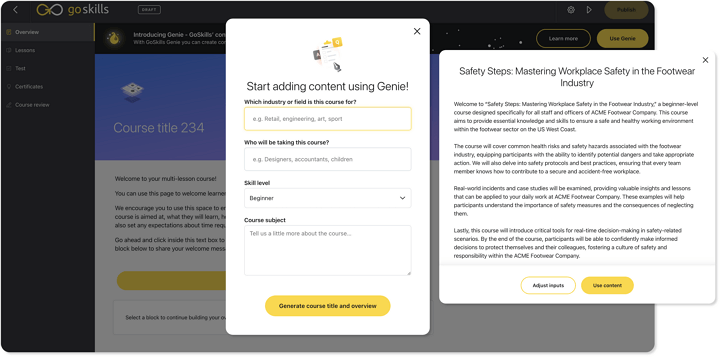
Multimedia and templates gallery
While a built-in gallery of images, ready-to-go course templates, pre-made courses, and other authoring resources may not necessarily be a must-have feature, providing one will greatly improve the course authoring process. Give plus points to LXPs that include this useful resource.
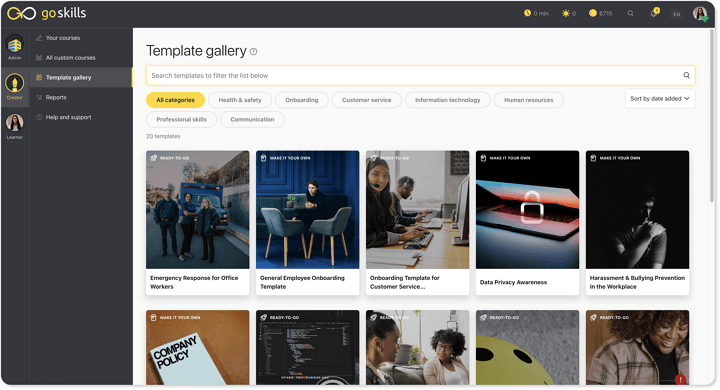
Course administration tools
A successful LXP enables L&D managers to organize separate training groups (e.g., internal teams, customers, external partners, etc.) with distinct course assignments and learning paths. Training managers should also be able to track everything from quiz scores and time spent learning to learner progress and achievement badges. The LXP should also have the capability to create and process feedback survey forms, and to create and award customized completion certificates when learners achieve specific milestones.
4. Community and social learning
Even with the most intuitive platform, you'll likely have questions about the service or need support at some point. Give plus points to any LXP that provides good, reliable customer service and maintains an active user community. These post-sale services can be invaluable for troubleshooting issues, fine-tuning LXP settings, sharing best practices, developing feedback-led product enhancements, and getting the most out of your learning platform.
Ongoing support
For an LXP to join your shortlist, it should offer ongoing, prompt, and relevant support to its customers. This includes the following components:
- FAQs and knowledge base (e.g., articles, guides, webinars, video tutorials, etc.)
- Customer support team (human agents, incident management, and ticketing system, etc.)
- Support channels (phone, email, chat, user forums, social media, etc.)
Active community
Give plus points to LXPs that maintain an active community of stakeholders — customers, instructors, learners, and LXP moderators — who share knowledge and provide peer-to-peer support.
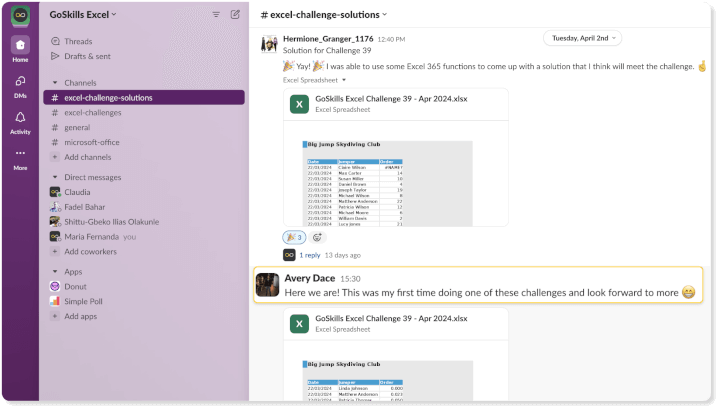
5. Scalability and pricing
Your organization evolves over time. So should your LXP. As your company grows, your learning platform should be able to scale with you by accommodating more users, instructors, courses, and data — without skipping a beat.
Scalability
Does the platform appear to serve only small teams and companies? Deprioritize an LXP with a client portfolio that does not indicate a customer with a sizable workforce. Verify whether the platform's service infrastructure could support growing organizations. Better yet, go for one that serves businesses of all forms and sizes.
Long-term cost and support
Pricing is always a key factor. Find the right balance between what you need and what you can afford. Consider not only the upfront price but also any ongoing fees, such as subscription costs, maintenance, or additional features. Note that some vendors implement highly variable pricing walled off behind demo calls. To make things easier, look for LXPs with simple, transparent pricing so you won't be surprised by any hidden costs that suddenly turn up on your billing statement. Some vendors implement progressively discounted costs per user as a company's workforce grows.
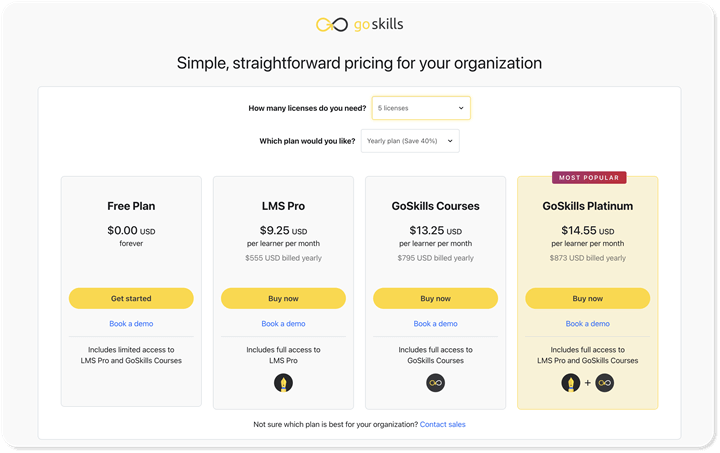
Free version
Go for free trials, but show love to excellent LXPs that offer a free plan. You should be able to explore the platform in an unhurried manner to determine if it's right for your team. At the end of the day, an ROI comparison among the LXPs on your shortlist should guide your final selection.
6. Integration with existing systems
Today's tech ecosystem requires an LXP to meet regulatory standards and to have robust interoperability with other software commonly used by businesses.
Ease of implementation
Deploying an LXP should be a simple, plug-and-play process.
Accessibility and inclusivity
Good learning experience platforms go beyond baseline standards by supporting impairments with features such as closed captioning and adjustable text to enable all learners to access and benefit from the course content.
API/third-party integrations
Whether it's integrating with HR systems, collaboration tools, or any other software, seamless integration can make life a lot easier by automating secure data transfers, updating API builds, providing Single Sign-On (SSO) options to streamline access, and keeping everything in sync.
Automatic provisioning
An LXP that supports System for Cross-domain Identity Management (SCIM) reduces the need for ongoing manual administration by automatically creating and removing learners and teams when they are created and removed in a key cloud-based domain used by a company such as Microsoft Azure/Microsoft 365 directory. Without SCIM support, your IT team might need to write custom software connectors to join an LXP to your main identity management systems.
Support for elearning standards:
Any decent LXP also supports best practices for accessibility and inclusivity, as well as elearning standards such as SCORM, AICC, xAPI, and CMI5.
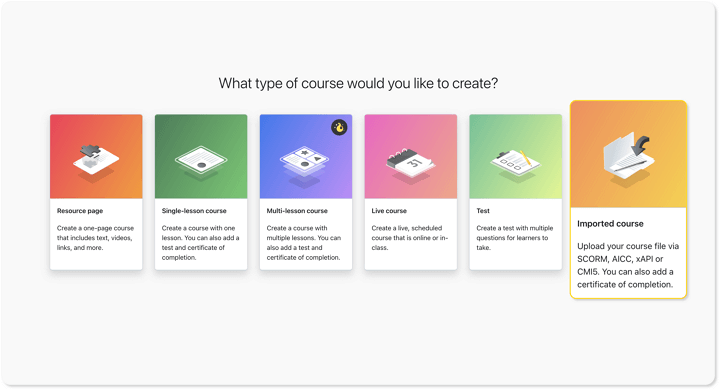
7. Ability to evaluate the learner experience
Understanding how well your training program is working for learners is crucial to a team's success. Remember: you only know what you measure.
Team leads, managers, and training administrators should be able to easily access and crunch all the data they need to uncover learner behavior and insights that will optimize training outcomes.
A robust LXP should offer comprehensive analytics and reporting tools to assess key metrics such as learner engagement, completion rates, and knowledge retention.
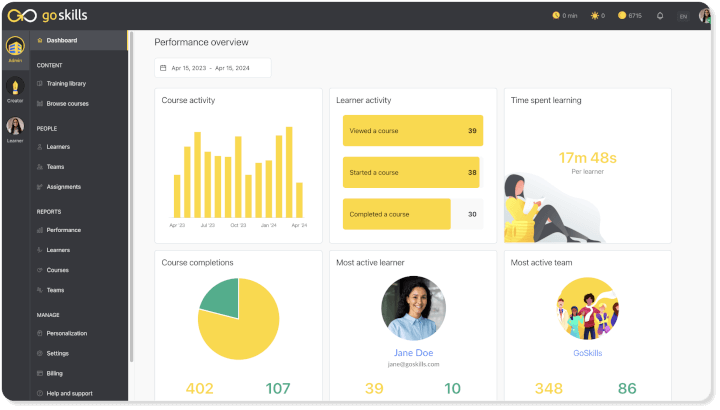
Key metrics
A standard LXP should be able to report on key metrics:
- Learner engagement: Are learners logging in regularly and routinely interacting with course materials and training content?
- Completion rates: Are learners maintaining motivation to see their courses through to the end?
- Knowledge retention: Are learners able to successfully retain what they've learned throughout their training?
Targeted reporting
Your platform's reporting capabilities should go beyond the standard metrics and should be able to generate deeper insight from more granular data points (e.g., time spent on individual lessons, etc.) to further customize the learner experience and improve training outcomes.
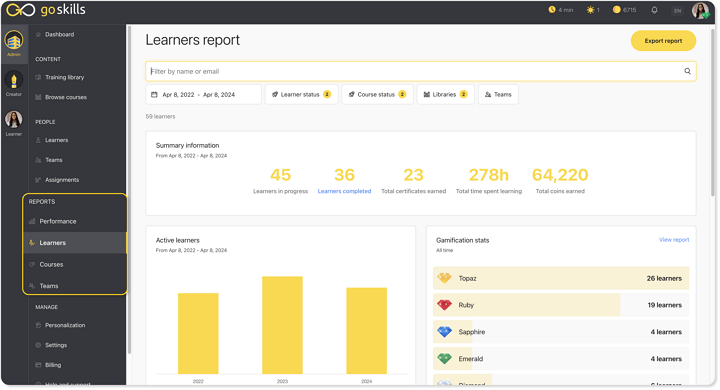
Data analysis for course creators
While LXPs are designed specifically to meet learner needs, there's another key player to keep in mind: course creators. Course designers and instructors should be able to evaluate how each factor (e.g., subject, lesson format and duration, instructional approach, assessment methods, learner demographics, etc.) influences the success or impact of specific courses.
Assessment and feedback tools
Assessment tools — whether in the form of quizzes, surveys, contests, or games — are crucial for gauging learner progress and individualized needs, and for uncovering insights that can help enhance specific courses or learning tracks (and even the platform as a whole).
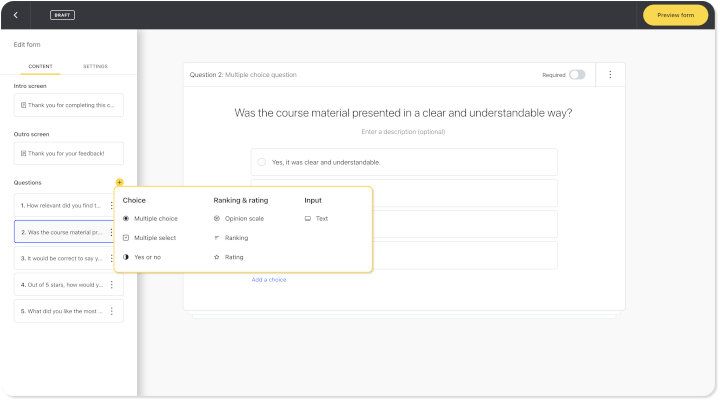
8. Track record of customer success
A flashy new solution on the shelf can be very appealing. But unless that solution truly has a compelling business case, it is better to look elsewhere. Industry leaders, incumbents, and long-term market players often provide more reasonable and less risky deals.
Years in business
Look for LXPs that have “been there and done that” for several years. Unblemished industry tenure not only reflects experience but also a network of well-established relationships with other ecosystem players such as L&D thought leaders, expert instructors, industry regulators and institutions, professional course designers, and accrediting bodies.
Industry accolades
A solution that consistently garners awards or gains industry recognition is always worth considering. Knowing how industry leaders position the product can help your decision-making.
Customer satisfaction
Finally, this is where the rubber meets the road. You may ignore what a vendor says about how good a product is — that would likely be just sales talk. But you can't ignore what its real customers say — that could spell the difference between a true success story and a tale of regret. There are numerous review sites you can visit, as well as some client testimonials you can verify. Be wary of providers that draw a significant volume of negative feedback that is corroborated by multiple independent reviewers. Likewise, give a second look at LXPs that have overwhelmingly sterling reviews.
Choosing the right LXP is a crucial decision for any organization looking to invest in elearning. By focusing on the foregoing key criteria, you can ensure that you select a platform that meets your needs, engages your learners, and ultimately contributes to the success of your training programs.
From "good" to "great!" training
How to maximize learner engagement with a blended LMS and LXP
Final verdict and takeaway
Let's cut to the chase. You've reached this point and deserve clarity on how your organization will benefit by choosing our platform.
To recap, here's why GoSkills might be the right choice for you:
- We've been in the market since 2013, when we introduced our learner-centric platform as the high-quality alternative to popular online courses. To help organizations achieve their training goals, we fused the best elements of LXP and LMS into a powerful all-in-one learning solution.
- Many companies looking for simplicity, ease of use, and course quality love our platform and use it to meet their team training objectives.
- Get started right away. Teams that deploy GoSkills typically get up and running in less than a day (compared to weeks with some other providers). They experience the same ease and convenience when they scale operations, integrate our platform with third-party systems, and use other resources that also support elearning standards as we do.
- Learners love our mobile-friendly bite-sized lessons, which they experience in a flexible, immersive, and gamified environment. We know this because the numbers don't lie; our customers see elevated levels of learner engagement, knowledge retention, and course completion rates.
- Instructors and course designers accelerate their workflows and enhance their outputs via our template gallery, support for a variety of content formats, and AI-assisted course authoring tool.
- L&D managers and administrators gain full visibility into every aspect of a training program through powerful data analytics and reporting features, enabling prompt remediation and optimal training outcomes.
- Our pricing is transparent, affordable, and simple. There are no hidden fees or setup costs. You can even start right away with GoSkills’ free plan.
- Our courses are industry-accredited. Course completion leads to relevant certifications such as those conferred by the Project Management Institute, International Association for Six Sigma Certification, Continuing Professional Development Certification Service, and PeopleCert. Meanwhile, our innovations earn accolades from global review platforms and institutions such as QS Reimagine Education and the International E-Learning Association.
- GoSkills is a labor of love. Our active community and ongoing support teams extend that love and care to all clients and stakeholders who trust our platform.
- You don't have to take our word for it. Just listen to what hundreds of our customers say in rave reviews on independent feedback sites such as G2, FinancesOnline, Software Advice, and Capterra.
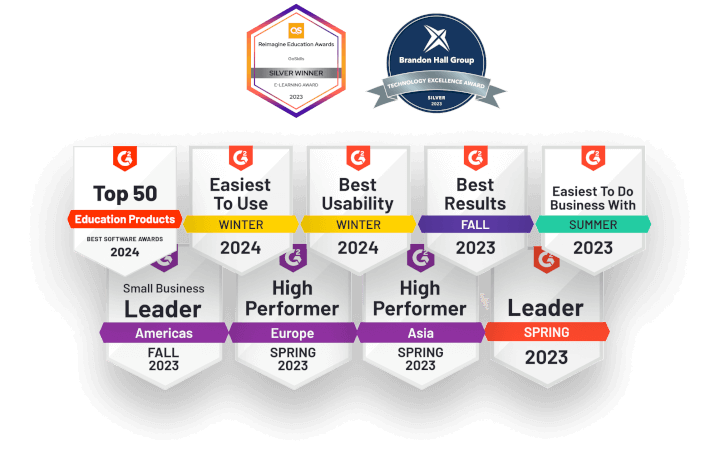
On the other hand, GoSkills may not be the best fit if:
- Your company needs a white-labeled platform designed for extreme customization.
- Your organization intends to sell courses using an LXP.
- You need to train multiple external partner organizations outside of your main company.
- Your company strictly implements a top-down approach to workplace training where adaptive learning and personalization do not count as priorities.
GoSkills' focus on learner experience reflects our belief that lifelong learning should be rich, stimulating, and fun. This mantra guides everything — from the platform's clean and beautiful user interface to the quality and impact of the courses it hosts.
That's why thousands of organizations — from startups to enterprises — rely on our platform, and why the industry recognizes our innovation and leadership year after year. That's also why you should try us out risk-free with a free forever plan.
Experience the difference
Start transforming the way your organization learns — no credit card required. Get started in minutes!
Create your free account now



